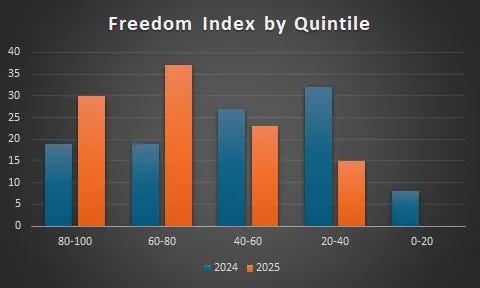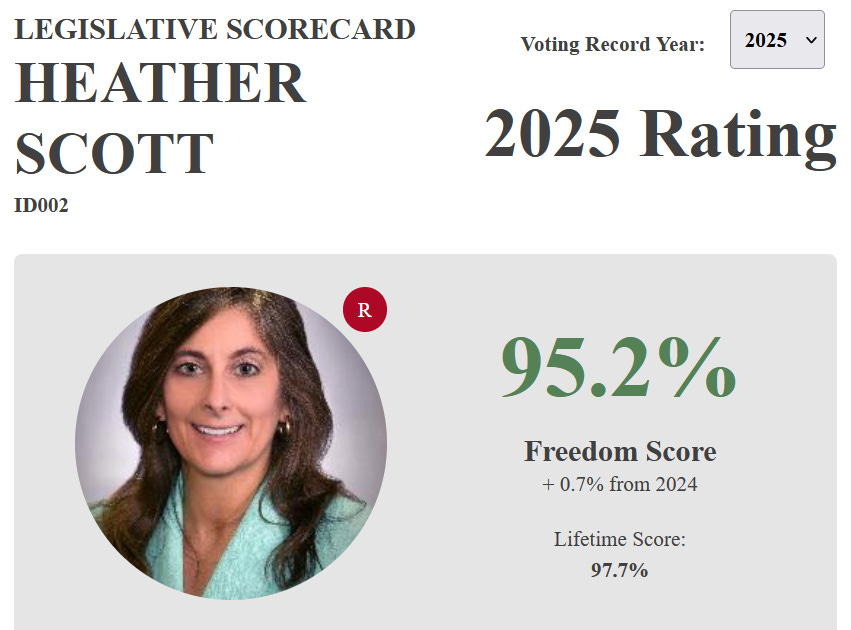Nearly a year ago, I wrote about how the results of the May 2024 primary election had the potential to reshape the Idaho Legislature. The 2023 and 2024 sessions had featured much frustration on the part of conservatives as moderate Republicans worked with Democrats to stymie good legislation. At the time, I believed the primary results could possibly lead to the most conservative Legislature in recent memory, despite a couple of tough losses:
In the end it was a good night for conservatives. Despite losing Herndon, Gallagher, Trakel, Lambert, and Young, we gained Rasor, Shippy, Cayler, Marmon, Tanner, Keyser, Hostetler, Kohl, and Leavitt. The geography of the state shifted, with LD1 turning more purple while LD24 and 25 went hard red. The Treasure Valley continues to be a battleground of ideologies and personalities.
The Idaho Freedom Caucus lost two public members in Herndon and Gallagher. However, the Main Street Caucus lost six: Schroeder, Yamamoto, Winder, Dixon, Hartgen, and Lanting. Both caucuses lost one member to retirement — Mike Kingsley from the IDFC and Abby Lee from the MSC. I’ve heard several veteran lawmakers talking about how to reconcile the dueling caucuses, so it will be interesting to watch what happens on that front leading into the next session.
What I didn’t fully understand at the time was the way in which a budding divide over strategy among conservative legislators would threaten that potential. The Idaho Freedom Caucus (IDFC), then an affiliate of the State Freedom Caucus Network (SFCN), split over whether or not to support Speaker Mike Moyle’s effort to win a 14th term in the Legislature.
Heading into the 2025 session, SFCN’s Idaho director Maria Nate put together a new coalition of legislators led by sophomore Sen. Glenneda Zuiderveld and returning Sen. Christy Zito that eventually called itself the Gang of Eight. This group also remained aligned with Young Americans for Liberty, a Texas-based organization that promotes conservative and libertarian legislation at the state level.
On the other hand, members of the old Idaho Freedom Caucus, led by Rep. Heather Scott and Sen. Tammy Nichols, continued separately under that name, adding several freshman legislators as well.
I wrote about that divide in December. Acknowledging that I could not possibly be unbiased, since at the time I was working with IDFC as a paid communications consultant, I tried to explain the perspective of both groups as fairly as possible. The difference between the two was not in ideology, or even policy, but in strategy. One side believed that having more conservatives in the Legislature was an opportunity to persuade those in the middle to move to the right, while the other side believed that the proper course of action was to hold the line and refuse any compromise.
I shared my own perspective at the time:
I believe that a lot of conflict comes from trying to force other people to be more like ourselves. My own philosophy has always been more about persuasion than confrontation. That’s just who I am, it’s the way I work, it’s where I feel most comfortable operating. I know that opens me up to accusations of playing access politics, of compromising my principles, of straddling the fence. That’s fine, I’m used to it. I suggest that critics evaluate outcomes rather than strategies. The proof in the pudding will be what happens in this session and the next. Come April, I will as always share a brutally honest post-mortem with you all, addressing what worked and what didn’t.
The time has come for the promised post-mortem, and I believe that persuasion has won the day where confrontation failed. Several supporters of the SFCN/YAL strategy told me point blank that this session would be a failure, that the members of the IDFC who supported Speaker Moyle had traded their principles for a seat a the table, and that the result would be a squandering of the conservative potential we all saw last May.
Thankfully, this didn’t happen. Although conservatives did not get everything we wanted, we achieved a lot. First let’s take a look at what we did not accomplish:
- The SFCN/YAL faction spent a lot of political capital on opposing the legislative pay raise enacted by a citizen’s committee, but a resolution to reject the raise was killed by House leadership.
- The SFCN/YAL faction also spent a lot of capital on eliminating the sales tax on groceries, but the Legislature voted to increase the grocery tax credit instead. Many lawmakers said they would have supported a bill to eliminate those taxes, but leadership made sure any such bill never had a hearing.
- We did not see as much action on illegal immigration as most conservatives would have liked. A bill to enforce deportation orders against criminal aliens passed, as well as one restricting welfare programs to legal residents. However, E-Verify never had a hearing, nor did bills requiring reports of how many illegal aliens reside in Idaho or requiring law enforcement to enter into 287(g) agreements with Immigration and Customs Enforcement (ICE).
- Spending continued to increase. While I believe the Legislature was able to cut a lot from the governor’s original proposals, spending is continuing to increase faster than inflation and population growth. I’ll try to get final numbers in the coming days and do a deep dive on the budget, but after a 55% increase in spending over the past five years we need to see real and substantive cuts rather than just a decrease in the rate of increase.
- Medicaid Expansion was not repealed, although a bill meant to reform Medicaid passed and was signed by the governor.
However, those failures are dwarfed by this year’s successes. Matt Edwards of Citizens Alliance of Idaho laid out our victories on Twitter over the weekend:
The 2025 Legislative session is over.
Be it declared that,
In Idaho,💉 You will not be forced to undergo a medical intervention in order to study, work, or play.
💰 You will not be “debanked” for believing something else.
👧 You will not be forced to share a restroom, locker room or prison with a man if you are a female
😷 You will not be forced to wear a mask to participate in society.
📚You can use some of the money promised to educate your child outside of the public school system on what works best for your family.
☠️ You can sentence a child rapist to death by firing squad.
🏫 DEI in Higher-Ed is DEAD
🇺🇳 You won’t find refugees and illegal aliens being granted free services that citizens don’t even get access to.
🌍 The World Health Organization has no power here.
🗂️ Health Districts must base public health recommendations on science and are not permitted to do “all things.”
📖 Civics and cursive writing must be taught in k-12
🤰 Fetal development courses based on actual science must be taught in school.
📢 Free Speech is protected in college campuses.
🏳️⚧️🏳️🌈 Flying divisive flags is not allowed on government property or in schools.
👨⚖️ Judges can throw out frivolous lawsuits before they even get started.
⛺️ You won’t find people living in tents on the sidewalks are in city parks.
⚕️And soon, you’ll be able to buy ivermectin over the counter.
What a session! What’s on tap for 2026!?
I would add to that list more than $400 million in tax cuts, removing soda and candy from SNAP benefits, and significant progress in moving administrative rules to statute and removing the rule-making authority of several bureaucratic agencies.
It’s not just anecdotes. Though I have some concerns with the way in which the Idaho Freedom Foundation (IFF) rated some bills this year, the Freedom Index is still a useful data point in broadly evaluating how conservative our legislators are. In the 2024 session, Republican lawmakers averaged 59.2% on the Freedom Index, but in 2025 that number went up to 71.8%.
The center of gravity in the Idaho Legislature shifted significantly to the right this year. In 2024, the median score among Republicans was 52.8%, lining up with Rep. John Vander Woude and Sen. Todd Lakey. In 2025, the median score for Republicans was 71.2%, around the scores of Rep. Ted Hill and Sen. Brandon Shippy.
I believe two factors led to this improvement. First, this was undoubtedly a more conservative Legislature than last year. Many are saying it’s the most conservative legislative session ever, while the Idaho Education Association (IEA) complained to the press over the weekend that it was the worst session ever, which is high praise coming from them.
Second, IFF added a family values metric to the way it analyzes bills:
Does it promote the breakdown of the traditional family or the deconstruction of societal norms? Examples include promoting or incentivizing degeneracy, violating parental rights, and compromising the innocence of children. Conversely, does it protect or uphold the structure, tenets, and traditional values of Western society?
Critics of IFF point out how it approaches legislation from a somewhat libertarian viewpoint, which can lead to conflict with lawmakers and activists who hold a more traditionally conservative perspective. This new metric helps allay that issue, fixing problems such as when IFF rated a bill negatively in 2024 that required age verification for pornographic websites.
This rightward shift can be clearly seen by dividing Freedom Index scores by quintile and comparing this year to last year:

An outright majority of legislators scored higher than 60%, which is pretty incredible when you stop to think about it. In 2024, several Republicans joined Democrats in the 20-40 range, but in 2025, the lowest scoring Republican was still in the 40-60 range. Even Democrats shifted to the right, as none scored less than 20% this year. Some of the most effective conservative lawmakers ended up in the 70-80% range, but I’ll save that for another article.
IFF’s own metrics show that this session was a huge improvement on 2024, and I believe much of that success was due to the strategy of persuasion employed by conservative legislators. I recall hearing legislative leaders such as Speaker Moyle and House State Affairs Committee chairman Rep. Brent Crane express frustration last year with the factionalism and infighting between various caucuses, but my impression was they would rather work with more conservative members such as those in the IDFC rather than the more moderate members of the Main Street Caucus (MSC). I think this session has proved that strategy true. Many ideas that were killed last year such as mask mandate prohibitions, anti-SLAPP, and school choice were successful this year, partly due to legislative leadership being open to conservative ideas.
As the session began, many conservatives were dismayed when Sen. Kelly Anthon won election as president pro tempore, fearing that he would lead the Senate down a moderate path. That turned out not to be the case. He appointed several conservatives as committee chairs while moving legislation such as a bill to prohibit mask mandates and another to allow Ivermectin to be sold over the counter through the process. I believe Anthon responded positively to persuasion.
On the other hand, the strategy of confrontation hit a brick wall. YAL’s social media ads, text messages, and mailers calling conservative Republicans “traitors” for not opposing the pay increase or grocery tax credit increase backfired, not only alienating legislators but turning voters against the organization as well. Lawmakers aligned with YAL found themselves unable to advance any legislation, essentially blacklisted by leadership. I don’t condone this — I want to see good ideas go through the process in an open and transparent manner — but it was a predictable result of an aggressive strategy.
Indeed, adherents of the confrontational strategy seem to welcome this kind of conflict, believing that forcing showdowns like this will expose lawmakers to their voters, leading them to support conservative primary challengers. While I believe this strategy can have some merit when your faction is a tiny minority, it falls short in actually getting things done. It becomes too easy to sit on the sidelines and criticize those who are in the muddy and bloody process of legislating. For example, in late 2024, IFF ridiculed the interim committee on DEI, calling it an “exercise in futility”:
Last week, Idaho House Speaker Mike Moyle sent invitations to a few legislators to serve on an eight-member Diversity, Equity, and Inclusion (DEI) in Education Working Group. It’s unclear who will lead the group and who else will serve on the panel.
Please forgive the Idaho Freedom Foundation (IFF) for not falling over ourselves with enthusiasm about finally seeing something being done regarding the DEI plague on Idaho education. Color us skeptical.
The essay by IFF president Ron Nate concluded with a challenge:
We at the IFF, and no doubt many parents and students, are very interested in seeing what happens, but optimism remains a scarce commodity. Meanwhile, we spend money, waste time, and spin our hamster wheels, all while our public school children and college students are polluted on a daily basis with more DEI trash dumping.
Again, please prove us wrong.
It turns out the Legislature did prove them wrong. Sen. Ben Toews, who was a member of that interim committee, drafted legislation to ensure the pernicious ideology could not be forced on students of public colleges and universities. He based the bill on the work done by the committee in the off season. Senate State Affairs Committee chairman Sen. Jim Guthrie refused to give it a hearing, so Toews pared the bill down enough that Guthrie eventually and begrudgingly gave in. However, the House amended the bill to include much of Toews’ original language, bypassing Guthrie and his committee and sending the bill to Gov. Brad Little who signed it last Friday.
IFF issued a statement Friday night celebrating the passage of the bill, highlighting the organization’s work in fighting DEI for the past five years and giving due credit to the lawmakers who made it happen. However, it did not mention the organization’s earlier position or admit that it had been wrong this time.
This is what I mean when I talk about differences in strategy. All conservatives, whether aligned with IDFC, IFF, SFCN, YAL, or no faction at all, agreed that DEI is a pernicious ideology that needed to be stopped. However, whereas IFF’s strategy was mockery, calling the interim committee a pointless waste of time and money, lawmakers like Sen. Toews worked tirelessly to produce actual legislation. Had Toews simply “held the line” on his first draft, saying it was this or nothing, we would have achieved just that: nothing. Yet he persisted, negotiated, and even compromised, doing whatever was necessary to get a good bill through the process.
The strategy that wins an insurgency is not the same strategy that will effectively govern. Following the Battle of Yorktown, our Founding Fathers had to transition from rebels into leaders. The process of crafting our Constitution took place over many years and involved much negotiation and, yes, compromise. The fact that we have a country today is a testament to their leadership and farsightedness. Working together does not have to mean selling out. Building a conservative governing coalition in the Idaho Legislature does not mean throwing away the principles and values that motivated us to get there.
None of this is to disparage IFF as an organization or any of the great conservatives who work there. It has done great work over the years in documenting and exposing many things that need reform, such as the prevalence of DEI in higher education. Anna Miller, as director of IFF’s Center for American Education, wrote numerous in-depth reports explaining how pernicious ideologies like DEI had infected higher education, not just in Idaho but in other states as well. These reports laid the groundwork for the legislation that finally passed this year. I hope IFF stays focused on important work like this rather than getting pulled into factional infighting.
I remember several people assuring me in no uncertain terms that IDFC co-chair Rep. Heather Scott would surely see her Freedom Index score drop now that she “sold out” for a “seat at the table”. Yet that did not happen. Scott ended the session with a score of 95.2%, good for 7th out of 105. I believe this demonstrates that conservative legislators can adapt their strategy to changing conditions without sacrificing their core principles.

I promised readers a brutally honest post-mortem and I was going to carry it out no matter what happened. If I turned out to be wrong, and persuasion ended up the wrong strategy at the wrong time, I would have said so. Being a good political analyst means letting go of ego. In May of 2022, when a majority of my preferred candidates lost their primary elections, I laid out exactly why I thought they lost as well as where I had gone wrong in my analyses. Had this year turned out just the same as 2024, or worse, I would admitted it, taking an honest look at my own assumptions and preconceived notions. I hope that those who predicted doom will engage in the same level of introspection.
I am happy to have been proven correct, not necessarily because I enjoy being right but because this session has been great for the people of Idaho. The Bible teaches that there is a time and season for every purpose, and that applies to political strategy as well. There is a time for confrontation and a time for persuasion, and this year was a time for persuasion. I readily admit that confrontational politics helped bring us here, assisting in many of the primary races that went our way over the past few elections. Yet now, with a critical mass of conservative lawmakers in the Legislature, it’s time to adapt.
I believe that next year can be even better. Now that we’ve seen what worked and what didn’t, let’s all work together to win even more victories for the people of Idaho. I firmly believe that the IDFC, the Gang of Eight, and in fact a majority of Republicans in the Legislature are aligned on 90% of policy goals. Let’s form an even stronger conservative coalition heading into 2026 and build on the momentum we gained this year.
Gem State Chronicle is a reader-supported publication. To receive new posts and support my work, consider becoming a free or paid subscriber.
About Brian Almon
Brian Almon is the Editor of the Gem State Chronicle. He also serves as Chairman of the District 14 Republican Party and is a trustee of the Eagle Public Library Board. He lives with his wife and five children in Eagle.













